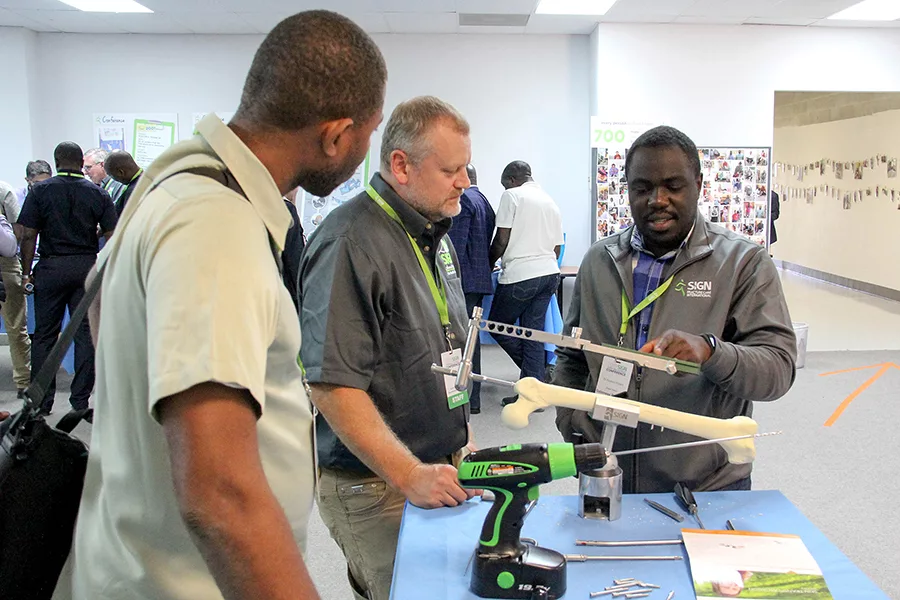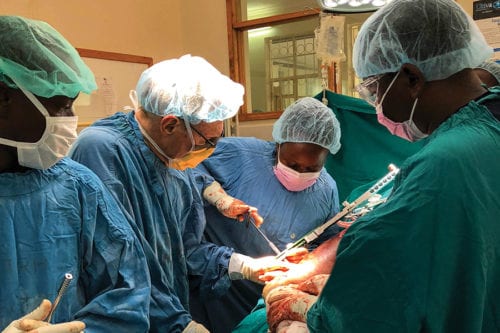
Home » SIGN Fracture Care ends 20th year with goals for next five years
SIGN Fracture Care ends 20th year with goals for next five years

December 16, 2019
By Andrew Kirk
SIGN Fracture Care International ends its 20th year in business with a goal to more than triple the number of patients it serves each year over the next five years.
Doctors trained by
Richland-based SIGN treat long-bone fractures in 30,000 people per year in
dozens of developing countries. The nonprofit manufactures the stainless steel
nails used in the surgeries at its north Richland facility.
By the end of 2019,
SIGN expects to have tended to 250,000 patients over 20 years.
By the end of 2025,
SIGN hopes to serve 100,000 people per year.
And to help more people
in the coming year will require more money.

“Funding is the
elephant in the room,” said founder and president Dr. Lewis Zirkle. “We can
only expand as we have funding.”
SIGN, which is off
George Washington Way across from Pacific Northwest National Laboratory in
north Richland, receives no government subsidies and the majority of its
donations come from the Tri-City area, Zirkle said.
The nonprofit spends
about 89 percent of its budget on training and implants, which are donated to
surgeons in hospitals lacking funding to provide modern treatment for
fractures.
SIGN implants and
procedures are designed to be used in places without electricity because so
many of the hospitals and clinics where the surgeons work lack power or have
unreliable utilities, Zirkle said.
By donating implants, SIGN makes surgery affordable for people who often live on less than $5 per day.
While many maladies are in decline as technology improves to make humans safer and healthier, long-bone fractures are on the rise, Zirkle said. As economies around the world advance, more people have access to motorized transportation, like motorcycles and scooters, which means more accidents and broken bones.
SIGN has had a healthy
impact on the Tri-City economy the past 20 years. Manufacturing implants
creates jobs and bringing surgeons to Richland for training fills hotel rooms
and restaurant booths.
“We can train 150
doctors when they come here,” said Jeanne Dillner, chief executive officer. “We
have 43 employees, 41 of whom are full time.”
“We love it here,”
Zirkle said. “We have been prompted to manufacture overseas, but we have such a
good staff working together; we’re almost a big family. We would not move from
the Tri-Cities.”
The nonprofit expanded
in January 2019 with the purchase of a 38,000 square-foot building it was
leasing a portion of from the Port of Benton, along with an additional 1.18
acres on an adjacent lot.
This means there is
room to build more training rooms and manufacturing areas.
Coming soon is an
education center for bio-skill labs, lectures or hands-on workshops, Dillner
said. SIGN hopes to have it completed in 2020.
“We are creating a
development cell so the engineers can have their own machines to build
prototypes and to work with the machinists in building better manufacturing
processes,” she said.
This is becoming
increasingly important as surgeons working with SIGN have requested help
expanding their offerings. Ethiopian doctors are starting a spine and pelvic
fracture care fellowship and are offering to train others throughout East
Africa.
Donations from medical
implant companies have enabled SIGN to start a spine fellowship program in
Addis Ababa, Ethiopia. Some of the surgeons also are working in Afghanistan
treating wounds from bombs and bullets. One of SIGN’s board members is heading
up a limb deformity program.
Two of the Ethiopian
surgeons are University of Toronto School of Medicine graduates.
SIGN strives to be innovative
in offering more care with limited resources and adapts to support these
requests for assistance, Zirkle said.
“The beauty of SIGN is
we don’t push people to use our products, but we take the opportunity to work
with those who are motivated and self-starters to facilitate them.
Pelvic-fracture care was their idea, not ours,” Dillner said.
Helping all these
different kinds of doctors means SIGN has gotten involved in all aspects of
surgery. For example, Zirkle said he just recently spoke with an expert on
using UV light to kill bacteria and decrease infections in operating rooms
lacking modern sterilization.
“We’re very
approachable. We want to prevent disabilities in developing countries. If they
have heart and want to introduce us to different skills, we’d love to hear from
them,” Dillner said.
That approachability
also has led to several collaborations, she said.
Two Washington State
University medical students are working on a project with SIGN to develop new
plates and nails for bones. Precision OS is helping SIGN create virtual reality
training for doctors.
“There are different
ways to learn. Lecturing is only 20 percent effective… now we’re making videos
and doing virtual reality. There’s a machine-learning project in cooperation
with Battelle,” Zirkle said.
Chitra Sivaraman, team
leader for data integration at PNNL, said she’s employing “deep learning
techniques” to analyze X-ray images to improve the success rate of orthopedic
surgeries.
“In the first stage,
PNNL has used machine learning to identify surgical implants such as nails,
screws and plates in a database of 500,000 images. Our goal is to also
identify fracture locations and correlate the implant and its location to the
success rate of the specific treatment,” she said. “Our model could then be
used to advise physicians on the best course of treatment and help the patients
quickly recover from fractures.”
Much learning can be
done by observation, Zirkle said, and SIGN wants to be “humble” in its
observations, learning from past mistakes or happy accidents.
“The average paper in
the literature might be observant of 50 to 100 surgeries. But we have 150,000
in the database. Put in old X-rays and learn new things,” he said.
Some doctors trained by
SIGN request help creating mobile clinics. The nonprofit can equip them with a
set of instruments to visit rural areas and perform surgeries, or train local
medical providers. This also expands the reach of the training and innovations.
“We have expansion
plans but we have to fit it in our budget,” Dillner said.
Donations made to SIGN in December will be matched by the Seattle Foundation. Go to signfracturecare.org for more information.
Editor's note: This story has been updated to make it clear that SIGN patients do not pay for the surgical implants. (12/16/19)
Local News Year in Review
KEYWORDS december 2019





